Picture this: you’re going on a ketogenic diet, eager to embrace a lifestyle that promises weight loss, greater health, and an increase in energy. But one question remains: how much water should I drink on keto?
Let me tell you, friend, that good hydration is the foundation of keto success. When you use fat for fuel, your body loses water faster, putting you in danger of dehydration. This can cause a variety of unpleasant symptoms, including exhaustion, headaches, muscle cramps, and constipation.
But don’t worry; I’m here to guide you through the waters of keto hydration. This comprehensive guide will teach you how to drink enough water to keep hydrated, avoid dehydration, and balance electrolytes.
Along the way, we’ll look at the best methods to incorporate water into your daily routine so that you may reap the full advantages of this revolutionary diet. So grab your water bottle, saddle in, and prepare to enter the realm of keto hydration. By the end of this adventure, you’ll be well-equipped to fulfil your appetite for keto success!
Starting the keto diet can be an exciting step toward weight loss and health objectives.
However, it’s critical to remember that this transforming diet necessitates careful water. As your body switches from burning carbohydrates to burning fat for fuel, it loses water more quickly, raising your risk of dehydration.
How Much Water Do You Need on Keto?
The average daily water intake recommended for women is eight glasses (64 ounces) and somewhat more for males. On the keto diet, however, you may need to boost your water consumption to 12 glasses (96 ounces) or more. This is because keto cleanses the body of extra water and electrolytes, putting you at risk of dehydration if you don’t refill these fluids adequately.
Tips for Staying Hydrated on Keto
- Drink Water Throughout the Day: Rather than drinking a lot of water simultaneously, spread it throughout the day. This will support maintaining steady levels of hydration.
- Carry a Water Bottle: Reusable water bottles are convenient to have on hand so you can consistently consume water while on the run.
- Drink Water Before, During, and After Meals: Hydrating during and after meals can help replenish fluids lost through biological processes while drinking water before meals can help with digestion.
- Infuse Your Water with Flavors: To improve the flavor and attractiveness of plain water, add slices of fruits, vegetables, or herbs if you feel that it’s too boring.
- Monitor Your Urine Color: Dehydration indicates dark yellow or amber-colored urine. Try to get a clear or pale yellow tint, indicating you are well hydrated.
Effects of Dehydration on Keto
Several adverse side effects of dehydration may impede your ketogenic success. These consist of:
- Fatigue and Low Energy: Your energy levels can be depleted by dehydration, which makes it harder to stay focused and participate in strenuous activity.
- Headaches and Muscle Cramps: Dehydration can cause discomfort and interfere with your everyday routine by creating headaches and muscular cramps.
- Constipation: Constipation and other digestive problems might result from dehydration because it can make feces harder to pass.
- Electrolyte Imbalance: Dehydration may cause issues with electrolyte balance, resulting in dizziness, irregular pulse, and muscle weakness.
Best Ways to Drink Water on Keto
- Carry a Water Tracker App: Use a water tracker app to keep track of your daily water
- intake and make sure you’re meeting your hydration goals.
- Set Reminders: Set alarms or reminders to remind yourself to drink water throughout the day.
- Infuse Water with Electrolytes: To recover the electrolytes lost due to dehydration, consider adding electrolyte supplements or powders to your water.
- Eat Water-Rich Foods: Water-rich fruits and vegetables such as watermelon, cucumbers, and spinach can help you stay hydrated.
- Avoid Sugary Drinks: Sugary drinks can dehydrate you and interfere with ketosis, so stick to water, unsweetened tea, or black coffee.
 Can drinking a lot of water lower ketones?
Can drinking a lot of water lower ketones?
While drinking plenty of water is important for overall health, it is unlikely to reduce ketone levels much. In fact, staying hydrated on a keto diet may aid in the maintenance of ketone synthesis. Excessive water consumption, on the other hand, can cause electrolyte imbalances, which can potentially compromise ketosis.
Carbohydrate consumption is the most important factor determining ketone levels. Reduced carbohydrate consumption forces your body to rely on ketones as an energy source, resulting in increased ketone synthesis.
How do I protect my kidneys on a keto diet?
Protecting your kidneys while on a keto diet is critical for general health and avoiding issues. Consider the following major strategies:
- Adequate Hydration: Drink plenty of water throughout the day to flush out waste and protect your kidneys.
- Moderate Protein Intake: Excessive protein consumption can strain the kidneys more. Aim for an average protein consumption that is matched to your specific requirements.
- Monitor Electrolytes: Check your electrolyte levels and ensure you’re refilling them properly. Electrolyte abnormalities can have an impact on renal function.
- Regular Checkups: Regularly visit your doctor to monitor kidney function and overall health.
Why am I so thirsty on keto?
The keto diet is known to cause increased thirst. This is because your body loses more water and electrolytes when it sheds excess water and switches to fat burning for fuel. To avoid dehydration, drink plenty of water throughout the day, especially during the first few days of ketosis.
What is the fastest way to reduce ketones?
Increase your carbohydrate intake to reduce ketone levels as quickly as possible. Consuming carbohydrates causes your body to revert to using glucose as its primary energy source, decreasing ketone synthesis. However, it is crucial to note that quick carbohydrate reintroduction might result in unpleasant side effects such as bloating, water retention, and weight gain.
Sum-up
When you start your keto journey, remember that staying properly hydrated means giving your body the critical fluids it needs to perform at its best—not merely drinking to relieve thirst. You’ll be laying the groundwork for an excellent keto experience devoid of the uncomfortable side effects of dehydration by consciously trying to drink more water.
Accept the power of water, and observe how it turns your ketogenic journey into a route that will help you reach your health and weight reduction objectives. Recall that maintaining adequate hydration is essential to unlocking your keto success, not simply a suggestion!
Remember that hydration is an investment in your health and keto success, not just a need. So drink up, remain hydrated, and revel in the transformational power of keto in all its splendor!


 Can drinking a lot of water lower ketones?
Can drinking a lot of water lower ketones?
Leave a Reply